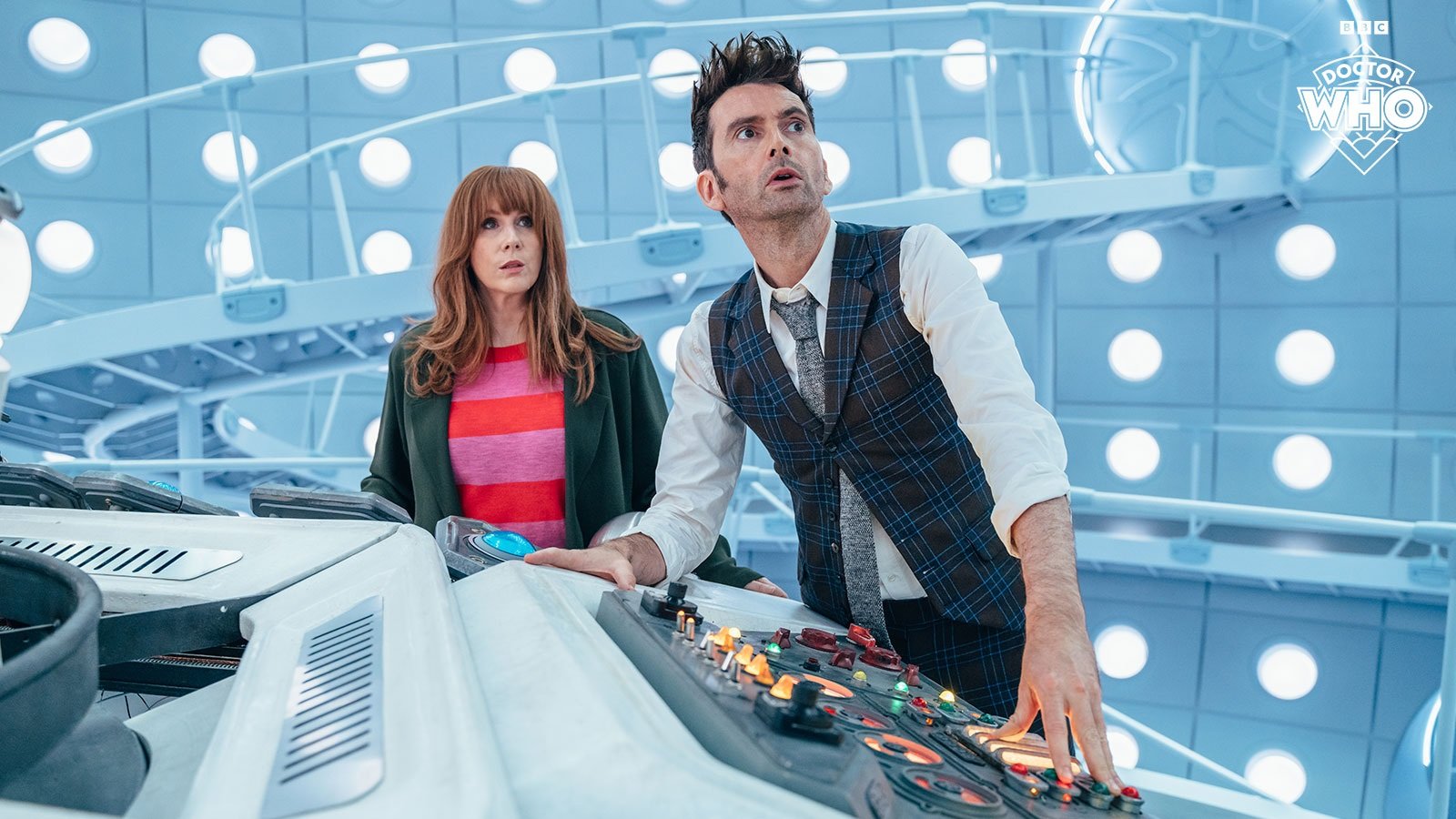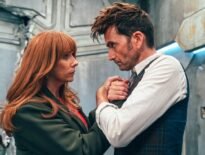Doctor Who is back on TV, celebrating its 60th anniversary by bringing back one of its most popular Doctor-companion combos in David Tennant and Catherine Tate. They exploded back onto the box with The Star Beast.
In his review, Peter Shaw focused on the audience that matters most:
“If you have read my previous reviews from the Jodie Whittaker era, you will know that I gauge part of the success of an episode by the reaction of my children: my son (12) and daughter (8). Frustratingly, the Thirteenth Doctor’s adventures were regularly characterised by both of them fidgeting, playing with other things, forgetting to follow the story, and asking questions about the logic of what is happening on screen (and me not having a suitable answer). Not so with The Star Beast. Their attention was wrapped — they laughed, gasped, and shouted ‘no!’ at appropriate moments, staying pretty-much glued to the action the whole time. This was meant to be a welcoming romp, so there were no behind-the-sofa scares in evidence. Hopefully next week…”
But what did the boring adults think? We sent a group of Wrarth Warriors to round up members of the DWC and put them on trial in a car park in Newpor– uh, London.
Simon Danes
Well, I loved the comic strip when it first came out. Beep the Meep is a creation of genius.
I really enjoyed it. I’ll leave it to others to review the episode itself in more detail. I will say, though, the way the Meep was realised was stunning. (Unleashed shows how it was done. I’d assumed it would be a wholly CGI creation and I was wrong. Wasn’t quite sure at first about the redesign from Dave Gibbons’ original but changed my mind when I saw the episode.)
I’ll just say a few words about the episode’s message.
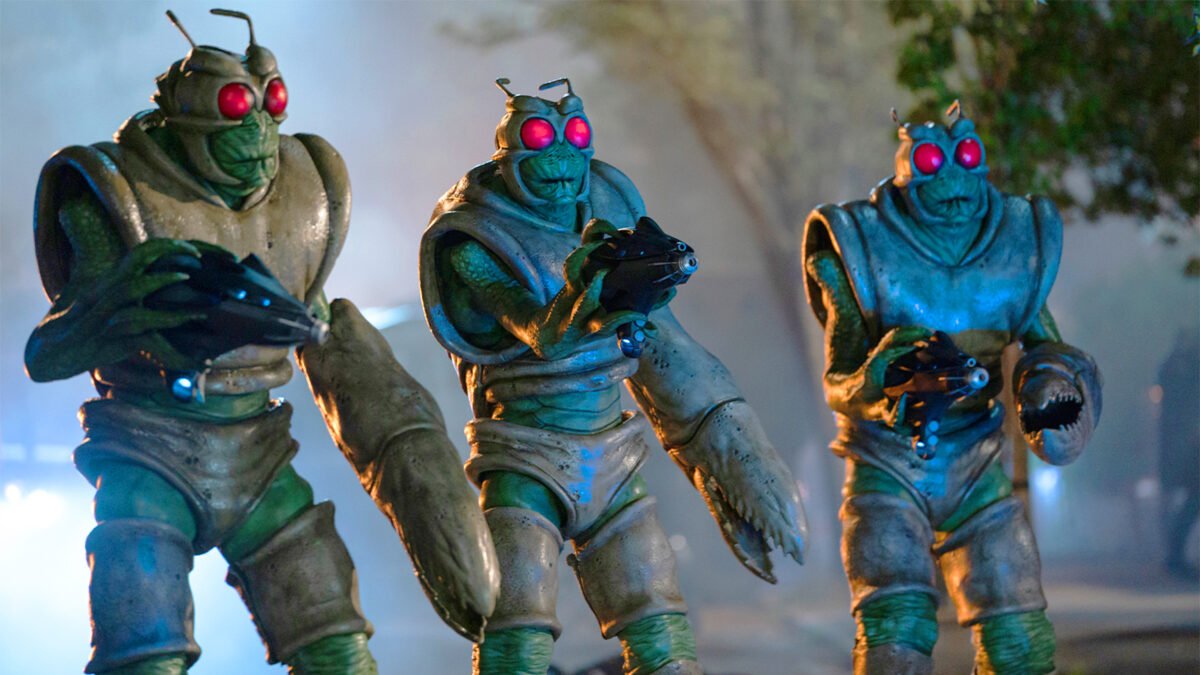
There was a message, and I’d argue it was a message with a small ‘m’ rather than a capital one. We were not beaten about the head with it. Perhaps I’m an old sentimentalist but I genuinely found it moving. Basically, the message was just ‘be nice to people.’ Believable characters in a family who loved each other, beautifully played by the cast. Caring about all your fellow human beings (and cuddly aliens too, of course) and not labelling some as beyond the pale. Donna’s giving away almost everything from the lottery win because other people – and people she’d never even met, at that – needed it more than she did. Genuine altruism rather than virtue signalling as the model. Ordinary people can do extraordinary things.
I could nit-pick at some aspects of the episode but I’m not going to. Catherine Tate’s Donna remains one of the best of all the Doctor’s companions in the show’s entire 60 years. Tennant was superb. Miriam Margolyes was pitch-perfect. It honoured the original comic strip without slavishly regurgitating it.
Fab.
James Whittington
“Woke”. “Anti-male”. “The message”. These are just some of the very negative comments you’ll see swirling around in time and space at the moment, all referring to The Star Beast. On the flip side, many comments include the words, “enlightening”, “empowering”, and “progressive”. Now, no matter which side you’re on, the episode has been debated to death. More than any I can recall over my professional writing career.
But let’s just rewind slightly. The (re)casting of David Tennent as the Fourteenth Doctor and the return of Catherine Tate gave returning showrunner Russell T Davis all the positive comment he could have hoped for. After the hideous run of Thirteenth Doctor stories (sorry Jodie, you’re a great actress but assigned awful stories and let’s not mention the Timeless Child nonsense), us fans had great hope. Then The Star Beast was shown and my heart, and those of many long-time fans, dropped.
What starts off as a wonderful, fun, and gorgeous looking sci-fi story with a great take on the comic book character, The Meep, soon degenerates into a morality tale which hammers home its opinion on gender ideology and shows just how much the series has lost its prime directive — that is, to entertain.
Doctor Who has always championed those who are oppressed, those who have suffered, and, up until recently, done so with panache, skill, and consideration. Now we are subjected to this, an episode which made a mockery of the whole discussion and debate.
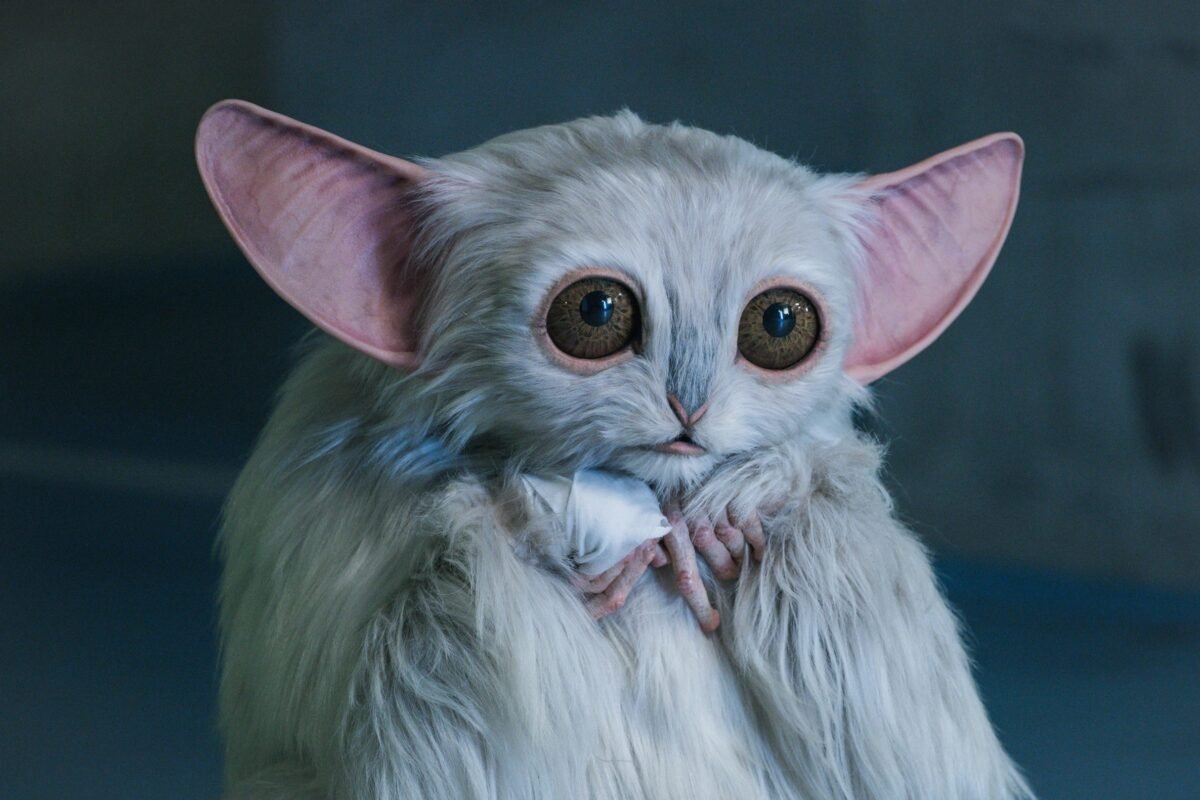
Trans people need to be heard and I cannot begin to comprehend or fully understand how much misery, negativity, and hatred they have had to suffer in their lives. But this topic could have been dealt with so much better. When Rose is being bullied (deadnamed) in the street, it’s truly heartfelt and, tragically, something trans people will no doubt face from those who are ignorant and uneducated on a day-to-day basis. The problem is the way the direction the story then takes and continuously patronises the audience. We are talked down to, then a bit more, then a bit more. This could have been a far stronger and more profound story about acceptance and understanding without overstating itself if it were in someone else’s hands.
If the next two stories are this preachy, then the series looks to be on a slide which it may never come back from.
Rick Lundeen
Russell can still deliver a romping great story!
I read the original Star Beast comic in Doctor Who Weekly once when it came out and I never did again. It wasn’t even remotely memorable, so RTD could have adapted it any which way and I wouldn’t be able to claim any mishandling. But turning that comic strip into live action — well, all I’ll say is that Mr. Davies is truly a master in this land of fiction. The realisation of the Meep, the Wrarth Warriors, be it the CGI bits or the practical effects and suits, this was Doctor Who as it should be.
Of course the controversial bits, to differing degrees — the “let it go”, the pronouns, the binary/non-binary, and the new powers for the sonic screwdriver. Working backwards, the screen wasn’t that far beyond the sonic’s normal duties; just visually cool. The defensive shields were a temporary stop-gap and far from invulnerable, so, as a delaying tactic, I don’t see the fuss. The pronoun scene… its biggest offense was reminding us it’s nice to be considerate of people’s wishes.
It’s very nice to have characters speak to each other naturally, and it feeling earned, feeling honest.
The binary thing. After watching it a second time, it comes across that the Doctor/Donna (male and female) and the metacrisis in Donna’s head — all that got passed down to Rose, who eventually identified as non-binary and trans. Interesting thought, that. And the “let it go” bit could be seen as a stretch throwing the message out there, but then again, I’m not a woman so maybe I’m not the authority here. I did think, though, that having the metacrisis shared between the two of them would have solved the problem in the first place, but I also didn’t realise you could just let it go. Small quibbles, and nothing compared to the overwhelming positives.

Donna was Donna through and through. From the first “What the hell?” to the spilling of the coffee, this was getting the band back together the right way. Poor Sylvia — for once, I liked her! Not sure I was all that impressed with Rose’s acting. She seemed a bit stiff. And the husband. Poor duffer. Good luck to him. Of course Tennant picked up right where he left off, and all of this felt right and natural.
The opening credits. I almost got weepy. I haven’t been that tingly and energized since watching Avengers: Endgame. The graphics, the ship, the vortex, that diamond logo. Just amazing.
Finally, the console room! It hasn’t been this clean and bright since Hartnell’s day. Smooth, dazzling, expansive. The filming possibilities are endless. I’m probably just in a giddy good mood after all the waiting, but the future does seem bright in more ways than one.
Philip Bates
This was… fine.
I was really hoping this would reawaken my love for new Doctor Who, but it hasn’t happened. The Star Beast left me feeling rather hollow — I’d say “emotionless”, if it weren’t for the fact I was actually annoyed and frustrated by it. I loved Donna’s send-off in Journey’s End, and while I was prepared for it to be rewritten by something better, instead we saw Donna getting over this rather massive trauma because, uh, women can just let it go? Anyone who has had problems with the Cybermen being defeated by emotion in the past should take issue with this patronising nonsense too.
It’s true: Doctor Who has always been political, but it shouldn’t be preachy. I feel such lecturing presumes the audience to be ignorant, dumb, or nasty: from my experience of Doctor Who fans in real life (the internet is an altogether different beast), they’re none of these things.
Aside from that malarky, we got the sonic screwdriver being a get-out-of-jail-free card. Don’t worry if there’s a Dalek round the corner! We can just whip up a shield from mid-air!
Oh, David Tennant was excellent though. Immediately, there he is: the Doctor, and gosh, it’s good to see him again. He’s great at what he does. That’s ultimately why he’s back, and why he’s such a beloved Doctor and actor. Still, he was the best thing in an otherwise disappointing story.

He was the only welcoming thing though. The new TARDIS is like a hospital ward. I went on a set visit (or three) to Capaldi’s TARDIS back in the day, and it was glorious. Warm. Alien. The TARDIS, through and through. This one… I certainly wouldn’t bother visiting, let alone travelling through time and space in it.
I’m being harsh on The Star Beast, I know. I guess it’s because I wanted more from it. This is where Wild Blue Yonder and The Giggle come in — we should be able to see what RTD is really going to deliver, what he has in store for Doctor Who from now on. I like Russell. He got me into Doctor Who. He’s written some exceptional stuff. He’s an incredible ambassador for the franchise. But I’d really like Doctor Who back please. Because The Star Beast was fine, and “fine” is not fine.
James Lomond
I was really excited about the return of the originating team to Who – and the Tennant-Tate TARDIS team was a wonder we were robbed of most bitterly! And this didn’t disappoint.
Not to be too nerdy but I LOVED the opening titles – finally the time vortex and the TARDIS’ flight is given the scale and grandeur it deserves. This is what was in my mind’s eye as a child (and adult) and it gave me the Who-chills I crave. The theme wasn’t Gold’s best work but you can’t pull a blinder every time and the poor chap has had to turn out a fair few variations.
The story was already familiar from the 1980 comic – I very much enjoyed RTD’s additions of the mortar-resonating roof escape and the fantastic ensemble cast who were just a joy to spend an hour with. Something I particularly enjoyed was the simple chutzpah of taking a somewhat child-like comic strip and adapting it for the screen, with a clear and wholehearted belief in the source material. It’s exactly the same piece of story-telling magic that made Marvel films so successful – a respect the work that’s gone before and that good storytellers know what they’re doing, whenever they’re from.
Although rather reminiscent of The End of Time, the partitioned control-room with the Doctor and Donna at the denouement was wonderful. It meant so much to those of us who’ve been along for the whole ride and allowed two wonderful actors to show us why they love what they do.
I was a little confused by the gender identity resolution – in that the exact physics of it escaped me and I wasn’t sure whether it was more a poetic call-back or more of a sci-fi mechanism that I wasn’t appreciating – the “binary, binary, binary” from so many years ago put me in mind of the wonderful piece of science fiction in Game of Thrones with Hodor’s character and how a phrase can echo backwards in time and create new meaning.
And finally the progressive messaging was fabulous – RTD has been a pioneer of representation since the 1990s when he created the first gay drama and transformed the media landscape forever. The storytelling around Rose’s character was deftly done and not intrusive into the story nor did it pressure her character’s with a clunky spotlight. I did think the “male-presenting” Time Lord line was perhaps a little on-the-nose and even unfair but one line doesn’t make or break a story. The most important message here was that there is 100% continuity, respect, and love for the era that preceded this and that feels important given the fuss that gets made in some quarters.
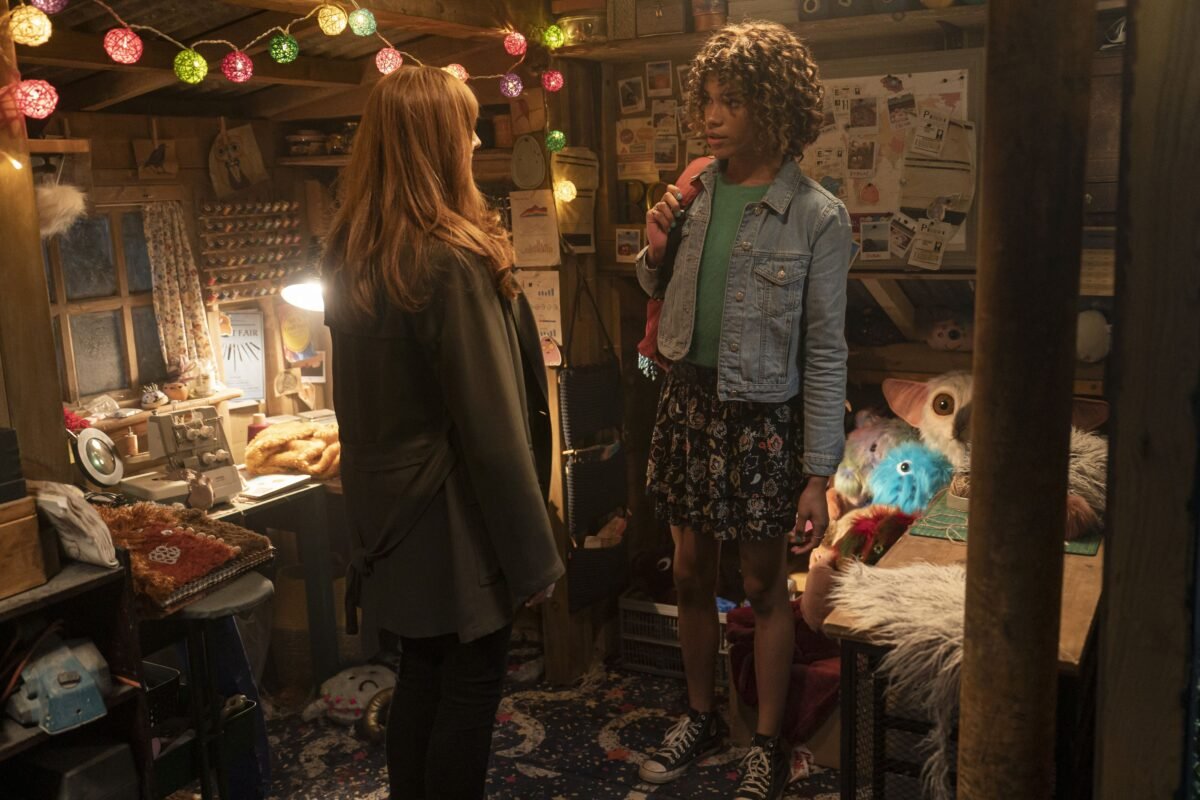
Thank you to the team at Bad Wolf for this zippy, joyful return to the Whoniverse and I am really excited for next week’s creepier offering which looks right up my street…
Alex Fitch
An enormous return to form for Doctor Who, as the show gets ‘the band back together’ – Russell T. Davies, David Tennant, Catherine Tate, Murray Gold, and the Bad Wolf execs – for a victory lap. While the plot was somewhat familiar (a cute alien found in a shed, sought by armed goons, even though the original comic the episode is based on predates E.T.), the sheer joy of seeing Tennant and Tate back on TV, and clearly having a ball, made for a terrific hour of television, and leaves the viewer sad that there’s only two more episodes with this team.
While Chris Chibnall’s tenure as showrunner had its ups and downs — with any episode featuring the Master and/or the ‘Fugitive Doctor’ being highlights of the past three years — The Star Beast proved that having episodes strongly featuring people who are members of minority groups, or marginalised in society, isn’t and never should be a problem, as long as their story is integrated properly into the narrative. So, while some of the Thirteenth Doctor’s episodes felt leaden as they tried to convey ‘an important message’ in a ham-fisted way, the introduction of Yasmin Finney as the new Rose, felt natural and intrinsic to the plot, but moreover, by her inclusion in the BBC’s flagship show, made the return of the programme feel genuinely progressive, rather than preachy. Equally, Ruth Madeley as the wheelchair bound Shirley Bingham is a great addition to the ‘UNIT family’. Although as she’s playing a not dissimilar role to her Hebe Harrison from Big Finish’s Sixth Doctor adventures, the script missed a trick by not having the Doctor make a comment about how she reminded him of someone from his past…
While the budget of the programme has notably increased, the slightly rubbery look of the Wrarth Warriors ties the monster design and execution to the show’s past, as well as the comic strip this episode was based on, with Star Beast creators Pat Mills and Dave Gibbons wonderfully front and centre in the credits – something other shows and films based on comics could learn from. Visually, director Rachel Talalay, who helmed some of the most memorable episodes of Steven Moffat’s tenure, brought her effortless mix of humour and great action to the set pieces, with only the Doctor finding a judge’s wig for a moment of legalese threating to break the fourth wall, as a callback to the Fourth Doctor doing the same.
Overall: great fun, often quite moving, enormously exciting, and leaves you wanting more. While the resolution of Donna’s Gallifreyan brainstorm narrative was again (like in Tennant’s previous finale) a little too easy, trailers for the next two episodes suggest there may still be trauma for Doctor-Donna fans ahead. Based on this episode, and with the promise of Ncuti Gatwa arriving at Christmas, if not before, the future of the show couldn’t be brighter.
Andrew Hsieh
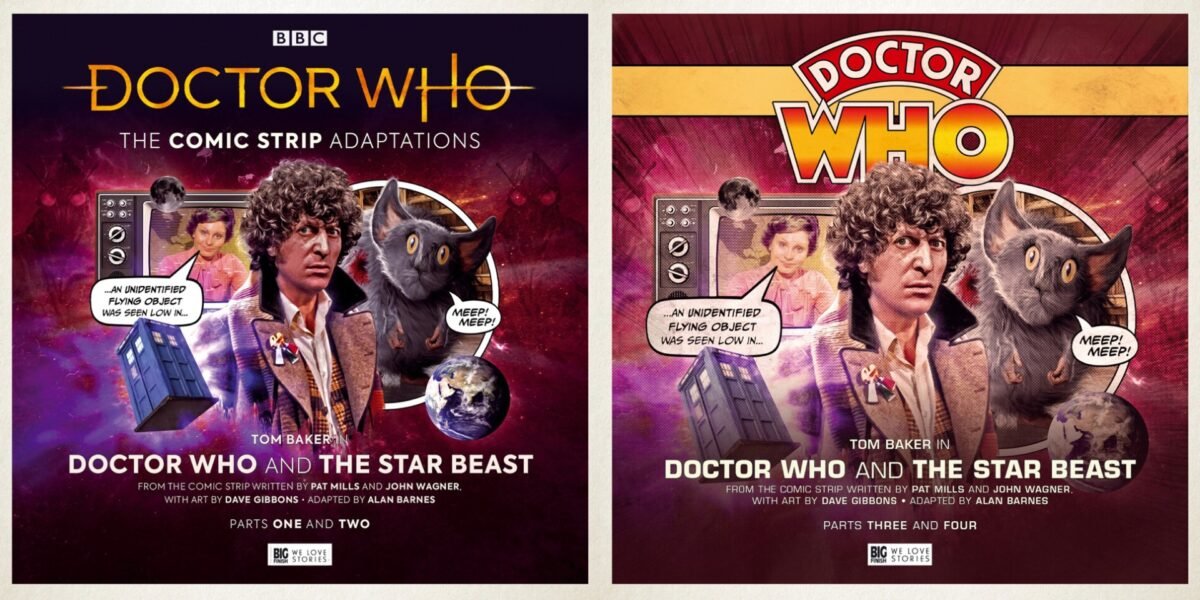
I grew up watching David Tennant and Catherine Tate during my childhood, and I never thought I would see them reunite for the 60th anniversary (even after doing some Big Finish audios together). If it weren’t for Emily Cook, who organised the Lockdown tweet/watchalongs in 2020, I think everything would turned out to be different. But that’s another story.
My absolute highlight is the shootout between UNIT (rogue soldiers included) and the Wrarth Warriors, with the Doctor and the Nobles trying to escape with the Meep. A proper gunfighting action sequence is what RTD seems to enjoy adding to his scripts; something which the Moffat and Chibnall eras notably lacked. Well, there’s also Series 1’s Dalek (by Robert Shearman) which includes tons of bullets being fired against the titular “Metaltron”. If I ever get to write a Doctor Who episode one day, please let me add some gunfighting into my script.
So… what did I make of the first of the three 60th anniversary specials, overall, on the night it premiered? Perfection. Just perfection. A simple, yet straightforward way to introduce the Fourteenth Doctor onscreen, with the return of Donna Noble and a strong script by showrunner Russell T Davies (yes, my childhood hero is already back!). There were times when I laughed, there were times when I cried (both happy and sad tears), and there were times when I got hyped with the callbacks and nostalgia. Feels like 2008 all over again, doesn’t it!
Jason Z
When I realised that The Star Beast was being adapted for television, I saw yet another opportunity in my near-decade long campaign to get my daughter to like Doctor Who. One can, it seems, get a child into Star Wars by showing them a single episode of Lego Droid Tales, so much so that they will then watch eleven films and umpteen series; but for my favourite show there seems to be no such easy solution. And no, nor The Sarah Jane Adventures: with those creepy Slitheen, it was too scary.
I remember this story in the comics from when I was nine. That twist – the fact that (spoiler alert) the nice-looking goodie turns out to be evil, and the ugly ones are the goodies. Wow. It seemed to me to be the work of genius. (Look, I probably knew very little of Galaxy 4; information on old stories was not so readily available back then.) So I read it to my daughter, from my original issues of Doctor Who Weekly. Did it work? Nope. As always, she was horrified. When the trailer came out, matters became even worse: Beep the Meep is “creepy”, and, she said, “makes me scared of my toys”.
So, for me, this is not family viewing. From Beep the Meep’s entrance onwards, I watched it alone, and I enjoyed it. Mind you, I enjoyed The Power of the Doctor: I can put aside the faults and the elements which I don’t like and enjoy this for what it is, which is entertainment, and my favourite television programme. There was plenty going on; in an improvement from the previous era, it was well-explained and well-paced. The new sonic screwdriver and its powers! The dialogue when the Doctor breaks into Donna’s home – and the battle/escape set piece which followed! The new TARDIS set!
For me as a child of the Tom Baker era, David Tennant will never be my Doctor. He is too human a character, and at the same time I find it too easy to see the actor behind that – I feel he lacks range. Maybe the people behind Taggart, another of my favourite shows, were right never to give him a part. He’s a fan, and he’s my age, and I like these things about him, but he doesn’t convince me when he acts. Catherine Tate I found too bolshy, too over-the-top. The ending I found very preachy.

And as for my daughter: two days earlier, on the evening of 23rd November, I left her in the room while The Daleks in Colour was playing, because I was recording it, so that I could run a quick errand in the house. When I returned, she was watching it. She told me that it was “good”, that she was interested in seeing more; we watched that story the next evening. Now she is asking to see “more Doctor Who, not with the slimy ones [Slitheen], but with Daleks or the other metal ones”. Er, Quarks? Cybermen? Perhaps, for her at least, Doctor Who does now just about have its Lego Droid Tales after all.
Tyler Harris
It’s finally back! After what feels like a lifetime of waiting, Doctor Who has returned to our screens for the first of three 60th anniversary specials, and the first certainly did not disappoint! I cannot remember the last time I felt this excited for pretty much any piece of media, quite honestly, and these high expectations were met and exceeded by The Star Beast.
To call this episode a “return-to-form” feels incorrect, as I feel Doctor Who has never looked and felt so good. If anything, this feels like the natural evolution of the show that is famous for redecorating every few years, yet still with the same familiar charm and character that comes with 60 years of content. This is helped immensely by the return of several key faces, including Russell T Davies, Catherine Tate, and, of course, David Tennant – who portrays a Doctor similar to his prior incarnation, but different enough that it felt earned. Tate also shines in both hilarious and more serious moments, and the pure joy I felt seeing this duo back on screen together was unreal.
The story itself was brilliant fun, and the fact that they got Pat Mills and Dave Gibbons (the original writer and artist of The Star Beast comic) on set to see their creations come to life shows how much this team truly cares about what they’re doing. Speaking of these creations: seeing Beep the Meep (voiced by the ever-brilliant Miriam Margolyes) and the Wrarth Warriors created practically — and only supplemented with CGI — was excellent. It added such a Classic Who flavour to the episode and, again, radiates love and care for the source material so much.
There were small moments here and there that took me out of the action, but these were few and far between and quite trivial. For instance, the ending sequence when Rose and Donna just let go of the metacrisis energy felt a little… rushed? And don’t get me wrong: I think it was certainly the right call for them to get rid of the energy, but the way in which it was done left me thinking “well… okay then!” before we moved on. Similarly, Donna’s comment (whilst holding a coffee) about how she lost her job for spilling coffee on the computer was a nice bit of foreshadowing, but also the way in which that spill then occurred on the TARDIS console was a little too comical for my liking – if not still perfectly in character for Donna and for this show.

The new opening, both musically and visually, was a delight, and the new TARDIS interior made me squeal with excitement. In fact, I don’t think I stopped smiling for this entire special. I could talk for so much longer about this episode, but instead I just want to recommend you watch it. Long-time fan or brand new one, The Star Beast has something for everyone, and I cannot wait to see where we go from here.
Ida Wood
There’s no denying that The Star Beast is a nostalgic romp from start to finish, and that’s nostalgia for more than one era – and medium – of Doctor Who. You can also tell that the cast are absolutely loving what they are creating.
But once it’s packaged into 57 minutes of television drama, what’s its impact? The first thing I realised on reflection was so much of this episode was set at night and in dark spaces (or in appropriately lit domestic settings such as the ones fans watch from), and that I think was important for setting the tone. Most of this was filmed during a very sunny period in May 2022 (The DWC was on set, and it was scorching hot), but with it being broadcast at a time of year when it’s already dark by 4pm then it needed to not feel like a product of summer and instead something you’d get cosy with the family for to enjoy. And that cosiness is demonstrated absolutely beautifully by Jacqueline King as Sylvia Noble and her interactions with her granddaughter, Rose, when we first see the pair of them on screen.
The Doctor-Donna dynamic works amazingly when Donna is yet to remember who her best friend is, the Meep is adorable, humorous with its ‘meep, meep’ interjections and above all wonderfully evil, and that court scene really stood out as something where every single element of it looked ridiculous (particularly the wig) and didn’t feel like it was going to pay off as convincing drama. Yet the way it actually took itself seriously made it intense and enjoyable.
Russell T Davies said in the accompanying Doctor Who Unleashed episode that Jodie Whittaker’s regeneration into David Tennant freed him of any rules so he could play with new ideas, and the sonic screwdriver’s new functions and the metacrisis moments certainly highlighted that. Personally, I was left unconvinced by both but I feel like the sonic’s expanded powers will gain more validity if they are used again in future episodes.
The Sylvia/Rose dynamic made me cry, and Donna’s near-death almost did the same for it to all be ‘normal’ again so soon afterwards felt like being cheated of a proper emotional punch from a scene that had been acted so beautifully.
Jacqueline King’s performance was the best of the episode for me, with Karl Collins’ very enjoyably played Shaun Temple underused as a result of fitting so many of Donna’s family members into the script.
On a personal note, as a trans person I did cry at several moments and an even stronger connection to this story – beyond the fact I attended filming – is I’ve also had large scale retrograde amnesia reversed in a moment in a way that almost killed me. So to see that documented on Doctor Who was, well, surreal…
So far, then, Doctor Who‘s 60th anniversary celebrations have been a mixed bag. Stay tuned to the DWC for a review of Wild Blue Yonder, the second special starring the Fourteenth Doctor…
